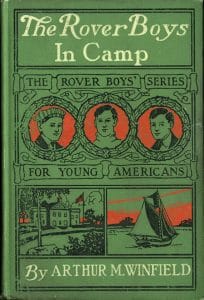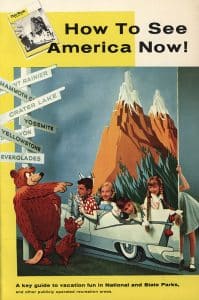“Summer just opens the door and lets you out.”
Deb Caletti, Honey, Baby, Sweetheart
The front of a school building shimmers in the sun. A loud bell rings. The doors burst open and a flood of children spills out, cheering and tossing papers into the air.
This image, used to the point of cliché, signals the start of summer and the freedom (albeit temporary) from the restrictions of school, the expectations of parents, and the anxieties of peer relations. In those precious ten weeks, an awkward misfit can shed his skin and emerge a swan, a hero, or a man. The transformational summer exists both in reality and in the mythology of American childhood: sleep-away camps and extended family vacations are real, formative experiences so universal that they are extensively used in young adult literature as a device for the protagonist’s internal transformation.
“At camp you train and train. And that’s all cool and everything, but the real world is where the monsters are.”
Rick Riordan, The Lightning Thief
 From their inception in the 1880s, summer camps were intended to fortify and reinvigorate America’s children—who were becoming physically and morally weak in modern cities—through immersion in the natural world. Campers acquired new skills, gained strength, and adopted new social roles in their weeks away from home. Boys and girls emerged at the end of the summer transformed by what they had accomplished and learned about themselves. In her exploration of the history of camp, Children’s Nature: the Rise of the American Summer Camp, Leslie Paris sums up the effect of the experience on children: “Coming back home again, they could not help but see their home lives a bit differently afterward, often with a greater sense of independence.”
From their inception in the 1880s, summer camps were intended to fortify and reinvigorate America’s children—who were becoming physically and morally weak in modern cities—through immersion in the natural world. Campers acquired new skills, gained strength, and adopted new social roles in their weeks away from home. Boys and girls emerged at the end of the summer transformed by what they had accomplished and learned about themselves. In her exploration of the history of camp, Children’s Nature: the Rise of the American Summer Camp, Leslie Paris sums up the effect of the experience on children: “Coming back home again, they could not help but see their home lives a bit differently afterward, often with a greater sense of independence.”
In the bestselling first installment of the Percy Jackson and the Olympians series, The Lightning Thief, summer camp is a place of true discovery and magic. Twelve-year-old Percy Jackson finds himself at Camp Half-Blood for the summer. There he learns that he is a demigod, the son of a human and the Greek god Poseidon. Percy and his campmates explore and hone their special demigod skills and set off on a quest to save Percy’s mother and return Zeus’ master lightning bolt.
“Awago Beach is this place where my family goes every summer. Ever since like … forever.”
Mariko Tamaki, This One Summer
 Where summer camp gives children a new sense of independence and self-confidence, the family vacation both solidifies and transforms their role in the family. Families can drift apart under the stresses of everyday life throughout the busy school year. A summer road trip or extended stay at the beach is the chance to reconnect with one another and experience a new environment. Susan Sessions Rugh traces the evolution of that distinctly American cultural ritual the family vacation in Are We There Yet? The Golden Age of American Family Vacations. Rugh offers that, year after hot, sweaty year, parents “justified taking a family vacation out of their commitment to the idea that travel together would strengthen family bonds, and that travel provided a way to educate children as citizens.”
Where summer camp gives children a new sense of independence and self-confidence, the family vacation both solidifies and transforms their role in the family. Families can drift apart under the stresses of everyday life throughout the busy school year. A summer road trip or extended stay at the beach is the chance to reconnect with one another and experience a new environment. Susan Sessions Rugh traces the evolution of that distinctly American cultural ritual the family vacation in Are We There Yet? The Golden Age of American Family Vacations. Rugh offers that, year after hot, sweaty year, parents “justified taking a family vacation out of their commitment to the idea that travel together would strengthen family bonds, and that travel provided a way to educate children as citizens.”
In the award-winning graphic novel This One Summer, Rose expects the same comfortable, predictable summer with her parents and her friend Windy at the beach. But this year, Rose is starting to notice boys and the romantic escapades of the teens around town—and the emotional drama of her parents’ strained relationship. Rose must come to terms with her own development into a young woman, her parents’ vulnerabilities, and the inability to recapture the innocence of summers past.
“Summer was supposed to be about freedom and youth and no school and possibilities and adventure and exploration. Summer was a book of hope.”
Benjamin Alire Sáenz, Aristotle and Dante Discover the Secrets of the Universe
 The summer of transformation is a theme used with great success in young adult literature. Classics such as Cynthia Voigt’s Homecoming and Judy Bloom’s Otherwise Known as Sheila the Great show us the emotional growth and healing that can occur in a few short months on the road or out of the city. Contemporary novels like Rules by Cynthia Lord and Aristotle and Dante Discover the Secrets of the Universe by Benjamin Alire Sáenz address modern issues: autism, disability, ethnic identity, violence, incarceration, and sexual orientation. Over two summers, the title characters of Sáenz’s award-winning novel come to terms with their identities, rejecting the lives of shame and secrets that the adults around them have lead.
The summer of transformation is a theme used with great success in young adult literature. Classics such as Cynthia Voigt’s Homecoming and Judy Bloom’s Otherwise Known as Sheila the Great show us the emotional growth and healing that can occur in a few short months on the road or out of the city. Contemporary novels like Rules by Cynthia Lord and Aristotle and Dante Discover the Secrets of the Universe by Benjamin Alire Sáenz address modern issues: autism, disability, ethnic identity, violence, incarceration, and sexual orientation. Over two summers, the title characters of Sáenz’s award-winning novel come to terms with their identities, rejecting the lives of shame and secrets that the adults around them have lead.
Summer is the perfect microcosm for growing up: we are never the same person at the end of August as we were at the beginning of July. The stories we tell of camp and vacations become the stories of our childhood, families, and the adults we grow to become. The summer novel is art that reflects this reality and at the same time adds to the mythology of the magical summer.



